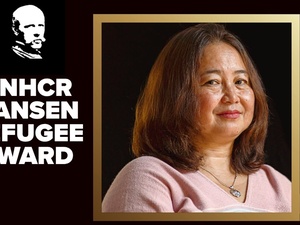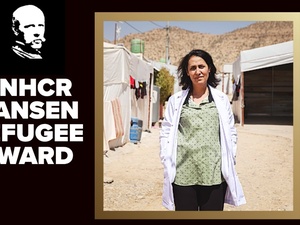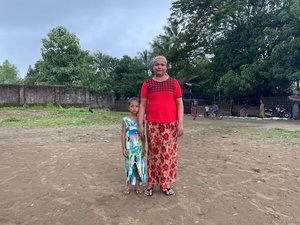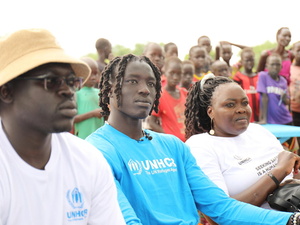Insecurity hinders access to displaced in north-eastern Burkina Faso
Insecurity hinders access to displaced in north-eastern Burkina Faso

An internally displaced woman with her child in Barsalogho, Burkina Faso.
UNHCR, the UN Refugee Agency, and our partners are facing severe challenges in accessing the internally displaced people and refugee populations in Burkina Faso as insecurity grips north-eastern parts of the country.
With almost 500,000 currently displaced, a recent upsurge of violent attacks by militants on military personnel and civilians is forcing thousands more to flee their homes in search of safety. About 300,000 people have been displaced in just the last four months in the country. The number of those displaced could reach 650,000 by the end of the year.
People fleeing the violence report attacks on their villages by extremists who often forcibly recruit male residents at gunpoint, killing those who resist. Militants also stole cattle and other possessions. Terrified of these attacks, residents have left everything behind, many seeking safety in Dori, a town of about 20,000 inhabitants close to the border of Mali and Niger.
We remain extremely worried about the safety and security of residents and the 26,000 Malian refugees who have been affected by the recent violent militant attacks in Burkina’s Sahel region.
The fate of people living in the north-eastern border town of Djibo, including some 7,000 refugees in the Mentao camp, is of special concern to us. Access to the town was cut in early November after a series of militants attacks. Attackers have murdered the mayor, destroyed houses and disrupted daily life.
Inside the Mentao camp, refugees are living in fear. All schools have been closed and humanitarian access to the camp has become increasingly challenging, with the distribution of aid, including food, severely hindered. UNHCR was forced to temporarily relocate its staff from Djibo, to work remotely.
We are working through partners to provide aid to those who are still living in Djibo and also assisting locals and refugees who have arrived in Dori, Bobo Dioulasso and Ouagadougou.
Displaced families are in desperate need of shelter, water and food. Many are sleeping in the open, as renting small brick houses from the local population is expensive. UNHCR is distributing specialized tents, known as refugee housing units (RHU), which have more ventilation, a lockable door and a small solar panel on the rooftop to provide light or to charge phones.
It is estimated that only 10 per cent of the shelter needs of the displaced people in Burkina Faso is covered at the moment. UNHCR is scaling up its relief efforts with urgently acquiring more shelter to complement the 3,335 already distributed and 1,880 currently being constructed in both Sahel and Centre Nord regions.
For communities and those forced to flee, access to documentation is essential to ensure freedom of movement. UNHCR has facilitated and financed the issuing of identity cards to internally displaced people, as well as birth certificates and other documentation that are essential to prove their identity, move freely or seek assistance.
We are calling for increased efforts to ensure the safety of the civilian population and humanitarian access to all affected in the region. Burkina Faso, Chad, Mali, Mauritania and Niger in September this year, adopted the "Bamako Conclusions,” reaffirming their commitments to protect civilians.
Currently, all of Burkina Faso’s 13 regions host people fleeing violence. The Centre-Nord region hosts the largest number of displaced people – more than 196,000 in Sanmatenga province alone – followed by the Sahel region, with almost 133,000 in Soum province.
For more information on this topic, please contact:
- In Ouagadougou, Marjanna Bergman, [email protected], +226 25 34 05 22
- In Ouagadougou, Moussa Bougma, [email protected], +226 70 40 50 56
- In Dakar, Romain Desclous, [email protected], +221 786 396 385
- In Geneva, Babar Baloch, [email protected], +41 79 513 9549









